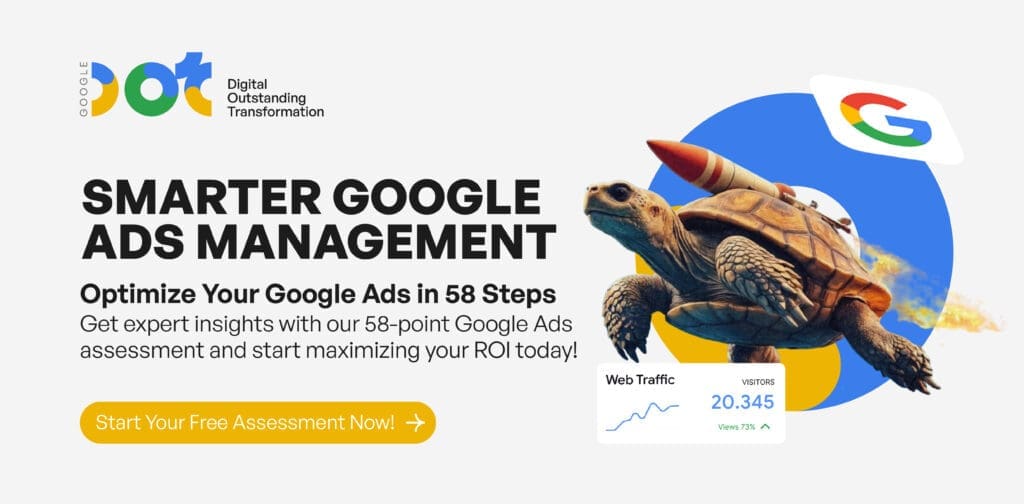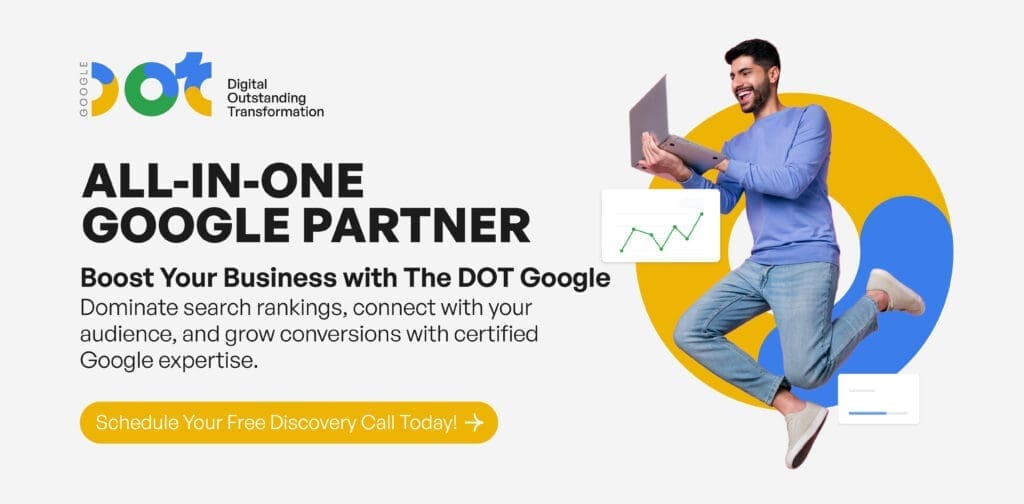Getting traffic isn’t the problem—getting the right traffic is. Some businesses pay for instant visibility, while others invest in long-term organic growth. Choose wrong, and you risk wasting budget or staying invisible in search results. Did you know? Paid search delivers 50% higher conversion rates, yet 70% of users skip ads in favor of organic results. So, which strategy makes the most sense for your business? We’re breaking down paid search vs organic search to help you choose the best option!
P.S., The DOT Google helps businesses take control of search—so their visibility isn’t left to chance. If ranking higher matters to you, you’re in the right place. Let’s talk!
TL;DR: Paid Search vs. Organic Search
- Paid search gets you to the top of search results instantly—but you pay per click, and traffic stops when your budget does.
- Organic search takes time to rank but delivers sustainable, free traffic once established.
- Paid search works best for businesses needing quick leads, targeted traffic, or launching new products.
- Organic search is ideal for long-term growth, credibility, and cost-effective traffic.
- The best strategy? A mix of both—paid search for immediate wins, SEO for lasting success.
What Is Paid Search?
Paid search is a digital advertising strategy where businesses bid on keywords to appear at the top of search results. Unlike organic search, paid ads offer instant visibility—but they require ongoing investment. Costs vary, and competition affects results, making it crucial to optimize campaigns for the best ROI.
How Paid Search Works
Paid search operates on an auction-based model. Businesses bid on keywords, and search engines decide which ads to display based on:
- Bid amount – Higher bids increase visibility.
- Ad relevance – High-quality, engaging ads get priority.
- Competition – Some industries pay a few cents per click, while others (like legal or finance) pay $50+ per click.
Optimizing paid search campaigns isn’t just about bidding high—it’s about bidding smart. Platforms like Google Ads reward well-structured campaigns with lower costs and better placements. At The DOT Google, we specialize in refining ad strategies to boost ROI—through expert keyword selection, A/B testing, and continuous performance tracking.

Why Businesses Use Paid Search
- Fast results – Unlike organic strategies, paid search puts you at the top immediately.
- Targeted traffic – Ads appear for users actively searching for your product or service.
- Scalability – You can increase or decrease spending based on performance.
Who Benefits Most from Paid Search?
- Businesses in competitive industries – If ranking organically is tough, ads provide an alternative.
- eCommerce and local services – Great for capturing users ready to buy.
- Brands launching new products – Need visibility now? Paid search guarantees eyes on your offer.
What Is Organic Search?
Organic search refers to unpaid search results that appear based on relevance, quality, and authority. Unlike paid search, it takes time to rank but delivers long-term traffic. SEO strategies like content optimization and backlinks help improve rankings—but how do search engines determine which pages rank the highest?
How Organic Search Works
Organic search relies on search engine optimization (SEO) to improve rankings naturally. This includes:
- Creating content that directly answers user searches.
- Building backlinks from reputable websites to boost authority.
- Improving site experience with fast load times and mobile-friendliness.
Ranking organically takes effort, but the payoff is sustainable traffic. The DOT Google’s SEO services focus on comprehensive keyword research, technical SEO audits, and strategic link-building to help businesses improve their organic visibility and stay ahead of the competition.

Why Businesses Invest in Organic Search
- Sustainable traffic – Unlike paid search, organic traffic doesn’t stop when ad spend ends.
- Higher trust and credibility – Users trust organic results more, with 75% skipping ads.
- Cost-effective in the long run – SEO requires upfront work but eliminates ongoing ad costs.
Who Benefits Most from Organic Search?
- Businesses focused on long-term growth – SEO compounds over time for steady traffic.
- Brands looking to build authority – High organic rankings establish trust in competitive markets.
- Companies with limited ad budgets – Organic search delivers free clicks over time.
Pros and Cons of Each: Paid Search vs Organic Search
Visibility matters, but how you get it depends on your strategy. Paid search delivers instant results, while organic search builds long-term traffic. Which is best? Read our blog on SEO vs SEM for a more in-depth breakdown.
| Feature | Paid Search | Organic Search |
| Speed | Immediate visibility – Ads appear instantly. | Slow results – Ranking can take months. |
| Targeting | Precise – Reach users based on location, device, and behavior. | Less control – Rankings depend on search intent and competition. |
| User Intent | Great for high-intent searches – Ideal for users ready to buy. | Broad reach – Captures users at all stages of the buying journey. |
| Cost | Costly – Pay per click; prices rise in competitive industries. | Cost-effective long-term – No per-click fees, just SEO investment. |
| Traffic Longevity | Disappears when you stop paying – No budget, no visibility. | Sustainable traffic – Once ranked, traffic flows without ad spend. |
| Trust & Credibility | Lower trust – Many users skip ads in favor of organic results. | Higher trust – Users see organic results as more credible. |
| Maintenance | Ongoing ad spend and optimization required. | Ongoing effort needed – Content updates, SEO fixes, and link-building required. |
| Risk | Dependence on ad budget and bidding competition. | No guarantees – Rankings depend on competition and algorithm changes. |
Which Strategy Works Best? Paid Search vs Organic Search
- eCommerce brands – Paid search captures ready-to-buy users.
- Local businesses – A mix works best: paid search for leads, organic for trust.
- Startups with tight budgets – Organic search is a long-term, cost-saving strategy.
At the end of the day, paid search vs organic search isn’t a choice—it’s a balance. The best results come from using paid search for quick wins while investing in organic search for sustainable growth.
Which Strategy is the Best for YOU?
Choosing between paid search vs organic search depends on your budget, goals, and competition. Some businesses need quick results, while others focus on long-term authority. Here’s how to decide.
1. Budget: Can You Afford Paid Traffic?
- Paid search delivers instant traffic—if you have the budget.
- Organic search is free but takes time to gain traction.
- Many businesses start with paid search while building their SEO strategy.
2. Goals: Short-Term vs. Long-Term Growth
- Need immediate leads? Paid search works best.
- Want consistent, lasting traffic? Organic search is the smarter choice.
- The best approach? Use both—paid search for quick wins, SEO for stability.
3. Competition: Can You Rank Organically?
- Competitive industries take longer to rank—paid search can bridge the gap.
- Low-competition niches can succeed with organic search alone.
- Established brands dominate organic results, making paid search a must for new businesses.
The best strategy? A mix of paid search vs organic search—quick wins from ads while SEO builds long-term success.
The Best of Both Worlds: Paid Search vs SEO Working Together
Many businesses choose between paid search vs organic search, but the best results come from using both. Paid search delivers quick traffic, while SEO builds lasting visibility. Together, they maximize search exposure, credibility, and conversions—creating a sustainable, high-ROI strategy.
When to Use Each:
- Paid search for quick leads, keyword testing, and scaling fast.
- SEO for lasting trust, organic traffic, and lower long-term costs.
- Adjust spending—reduce paid ads as organic rankings improve.
The takeaway? Paid search vs organic search isn’t a choice—it’s a strategy. Use paid search for quick wins while SEO secures long-term success.
Find the Right Search Strategy with The DOT Google
Understanding the differences between paid search vs organic search puts you in control of your digital strategy. Whether you’re looking for quick wins or long-term growth, you now know how to make smarter marketing decisions. Here’s a quick recap of what we covered:
- Paid search delivers instant traffic but requires ongoing investment.
- Organic search builds credibility and long-term visibility.
- A balanced strategy leverages both for maximum results.
- SEO improves rankings, while PPC drives targeted leads.
- Data and analytics help refine both approaches over time.
At The DOT Google, we specialize in both paid and organic search strategies, ensuring businesses maximize their visibility and conversions. Whether you’re looking for immediate leads or long-term SEO growth, our experts craft tailored strategies to meet your goals. Let’s build a search strategy that works for you.
